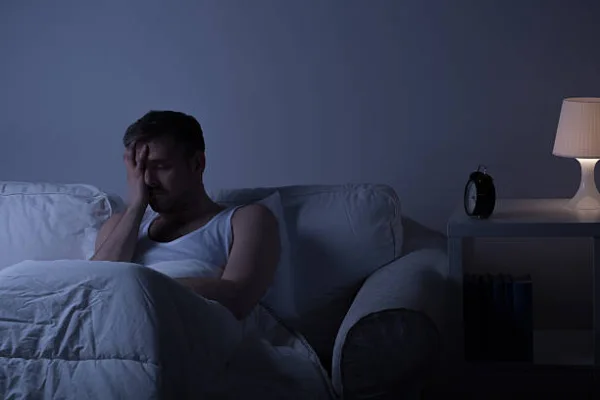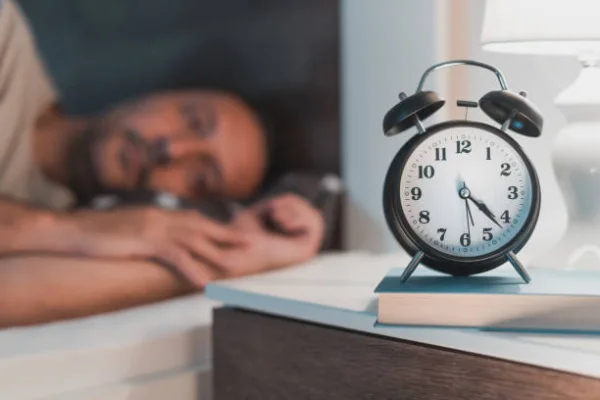Too Many Requests from Your Network
Please complete verification to access this content.
This article aims to explore the phenomenon of early morning awakening and provide scientific explanations for its occurrence.
By examining the intricate relationship between our internal biological clock, known as the circadian rhythm, and sleep patterns, we can gain a deeper understanding of why individuals may wake up at 4am without any apparent reason.
Additionally, psychological factors and external triggers will be investigated to shed light on this perplexing experience.
Finally, practical tips and strategies will be offered to help regulate sleep and wake-up times for those seeking a more restful night’s sleep.
The Science Behind Early Morning Awakening
The occurrence of early morning awakening can be attributed to various physiological and psychological factors, which have been explored in scientific research. Biological factors play a significant role in influencing early morning awakening.
The human body has an internal clock, known as the circadian rhythm, which regulates sleep-wake cycles. Disruptions to this rhythm can lead to awakenings during the early morning hours. Additionally, changes in hormone levels, such as cortisol and melatonin, can also contribute to waking up earlier than desired.
Moreover, the impact of sleep quality on early morning wake-ups cannot be ignored. Poor sleep quality is associated with frequent awakenings throughout the night, including early morning awakenings. Factors like insomnia, sleep disorders, stress, anxiety or depression can disrupt sleep patterns and result in waking up prematurely.
Understanding these biological and psychological factors can help individuals better manage their sleep patterns and improve overall sleep quality. It is important to prioritize good sleep hygiene practices such as maintaining a consistent bedtime routine and creating a conducive sleeping environment to promote uninterrupted rest during the night.
Understanding the Circadian Rhythm and Sleep Patterns
Understanding the circadian rhythm and sleep patterns involves examining the biological processes that regulate our internal body clock. The circadian rhythm is a 24-hour cycle that regulates various physiological functions, including sleep-wake cycles. It is influenced by external cues such as light and temperature, as well as internal factors like hormones. Disruptions in the circadian rhythm can lead to sleep disorders, such as insomnia or delayed sleep phase syndrome.
In recent years, the impact of technology on our sleep patterns has gained attention. The use of electronic devices before bedtime has been shown to suppress melatonin production, a hormone that promotes sleepiness. This can delay the onset of sleep and contribute to difficulties in falling asleep at night.
Uncovering the psychological factors of 4am wake-ups requires further investigation into individual experiences and circumstances. By understanding both the biological and psychological aspects of early morning awakenings, we can develop effective strategies to improve sleep quality and overall well-being.
Uncovering the Psychological Factors of 4am Wake-Ups
Uncovering the psychological factors of 4am wake-ups involves exploring the underlying cognitive and emotional processes that may contribute to this early morning phenomenon. Several key factors have been identified in research:
-
Impact of stress on early morning awakening: High levels of stress can disrupt sleep patterns, leading to waking up at 4am. Stress activates the body’s fight-or-flight response, causing increased alertness and difficulty falling back asleep.
-
Effects of medication on 4am wake-ups: Certain medications, such as stimulants or antidepressants, can interfere with sleep cycles and lead to early morning awakenings. These medications may affect neurotransmitters in the brain involved in regulating sleep-wake cycles.
-
Disrupted circadian rhythm: An irregular sleep schedule or exposure to bright light before bedtime can disrupt the body’s internal clock, resulting in waking up at 4am.
-
Anxiety and rumination: Individuals experiencing anxiety or excessive worry may find their thoughts racing during nighttime hours, making it difficult to stay asleep past 4am.
-
Depression and mood disorders: Some studies suggest a link between depression and early morning awakening. Disturbances in brain chemistry associated with depression may influence sleep patterns, causing individuals to wake up earlier than desired.
Understanding these psychological factors can help individuals address underlying issues that contribute to their 4am wake-ups and improve overall sleep quality.
Exploring External Triggers for Early Morning Awakening
Exploring external triggers for early morning awakening involves analyzing environmental factors that may contribute to individuals waking up before their desired time. One such factor is the impact of caffeine consumption on early morning awakening. Research suggests that consuming caffeinated beverages, such as coffee or energy drinks, can disrupt sleep patterns and lead to early awakenings. Caffeine is a stimulant that increases alertness and delays the onset of sleep. Therefore, individuals who consume caffeine close to bedtime may experience difficulty falling asleep and are more likely to wake up earlier than intended.
Another external trigger worth examining is the relationship between screen time before bed and 4am wake-ups. The use of electronic devices, such as smartphones, tablets, or laptops, emits blue light which suppresses melatonin production—a hormone responsible for regulating sleep-wake cycles. Exposure to this light in the evening can delay sleep onset and disrupt the quality of sleep. Consequently, individuals who engage in extensive screen time before bed may find themselves waking up prematurely at 4am.
Understanding these external triggers can help individuals make informed decisions about their habits and environment in order to achieve more restful nights of sleep without experiencing early morning awakenings.
Tips and Strategies to Regulate Your Sleep and Wake-Up Time
Implementing effective strategies and adopting healthy sleep habits can contribute to regulating one’s sleep and wake-up time. Here are five tips that can help individuals achieve a more consistent sleep schedule:
-
Establish a regular bedtime routine, such as reading a book or taking a warm bath, to signal the body that it is time to wind down.
-
Create a conducive sleep environment by ensuring the bedroom is cool, dark, and quiet. Using earplugs or an eye mask can further enhance the sleeping environment.
-
Avoid stimulating activities close to bedtime, such as using electronic devices or consuming caffeine, as they can interfere with falling asleep.
-
Stick to a consistent sleep schedule by going to bed and waking up at the same time every day, even on weekends.
-
Engage in regular physical activity during the day, but avoid exercising too close to bedtime.
Frequently Asked Questions
Can Early Morning Awakening Be a Sign of a Medical Condition?
Early morning awakening can be a symptom of various medical conditions and sleep disorders. It is important to consult with a healthcare professional to determine the underlying cause and receive appropriate treatment.
Are There Any Natural Remedies or Lifestyle Changes That Can Help Prevent Early Morning Awakening?
Natural remedies and lifestyle changes can potentially help prevent early morning awakening. These interventions may include maintaining a consistent sleep schedule, creating a conducive sleep environment, practicing relaxation techniques, and avoiding stimulants before bedtime.
What Role Does Age Play in Experiencing Early Morning Awakenings?
The role of age in experiencing early morning awakenings involves hormonal changes that impact sleep quality. Research suggests that as individuals age, there may be a natural decline in sleep duration and an increase in wakefulness during the night.
Can Stress or Anxiety Contribute to Waking up at 4am?
Stress and anxiety can contribute to early morning awakenings, as they are associated with sleep disturbances. These factors can disrupt the overall sleep quality, leading to waking up at 4am without a specific reason.
Is It Normal to Feel Tired Throughout the Day if Waking up Early in the Morning?
Feeling tired throughout the day after waking up early in the morning is a common experience. This can impact productivity and make it difficult to feel energized. Understanding the factors contributing to this phenomenon is important for individuals seeking optimal well-being.









